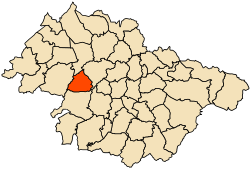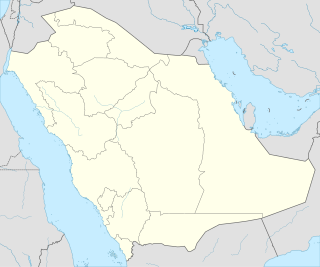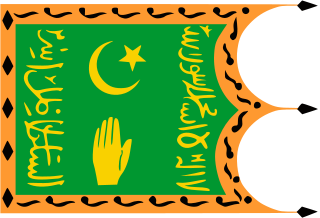Guittena | |
|---|---|
Commune and town | |
 | |
| Coordinates: Coordinates: 35°23′02″N0°12′16″W / 35.38389°N 0.20444°W | |
| Country | |
| Province | Mascara Province |
| Time zone | UTC+1 (CET) |
Guittena is a town and commune in Mascara Province, Algeria.
Guittena | |
|---|---|
Commune and town | |
 | |
| Coordinates: Coordinates: 35°23′02″N0°12′16″W / 35.38389°N 0.20444°W | |
| Country | |
| Province | Mascara Province |
| Time zone | UTC+1 (CET) |
Guittena is a town and commune in Mascara Province, Algeria.

Emir, sometimes transliterated amir, amier, or ameer, is a word of Arabic origin that can refer to a male monarch, aristocrat, holder of high-ranking military or political office, or other person possessing actual or ceremonial authority. The title has a long history of use in the Arab World, East Africa, West Africa, Central Asia, and the Indian subcontinent. In the modern era, when used as a formal monarchical title, it is roughly synonymous with "prince", applicable both to a son of a hereditary monarch, and to a reigning monarch of a sovereign principality, namely an emirate. The feminine form is emira, a cognate for "princess". Prior to its use as a monarchical title, the term "emir" was historically used to denote a "commander", "general", or "leader". In contemporary usage, "emir" is also sometimes used as either an honorary or formal title for the head of an Islamic, or Arab organisation or movement.

Sheikh Hamad bin Khalifa bin Hamad bin Abdullah bin Jassim bin Mohammed Al Thani is a member of the ruling Al Thani Qatari royal family. He was the ruling Emir of Qatar from 1995 until 2013 when he abdicated the throne, handing power to his son Tamim bin Hamad Al Thani. The Qatari government refers to him as the Father Emir.

The Emir, or Amir, of the State of Qatar is the monarch and head of state of the country. He is also the commander-in-chief of the Armed Forces and guarantor of the Constitution. He holds the most powerful position in the country, and has a prominent role in foreign relations.

The Emir of the State of Kuwait is the monarch and head of state of Kuwait, the country's most powerful office. The emirs of Kuwait are members of the Al Sabah dynasty.

Emir Kusturica is a Serbian film director, screenwriter, actor, producer and musician. He also has French citizenship. Kusturica is one of the most-distinguished European filmmakers since the mid-1980s, best known for surreal and naturalistic movies that express deep sympathies for people from the margins. He has also been recognized for his projects in town-building. He has competed at the Cannes Film Festival on five occasions and won the Palme d'Or twice, as well as the Best Director prize for Time of the Gypsies.

The Provinces of Saudi Arabia, also known as Regions, and officially the Emirates of the Provinces of the Kingdom of Saudi Arabia, are the 13 first-level administrative divisions of the Kingdom of Saudi Arabia.

Kano is a city in northern Nigeria and the capital of Kano State. It is the second largest city in Nigeria after Lagos, with over four million citizens living within 449 km2 (173 sq mi); located in the Savanna, south of the Sahel, Kano is a major route of the trans-Saharan trade. The city has been a trade and human settlement for millennia. It is the traditional state of the Dabo dynasty who since the 19th century have ruled as emirs over the city-state. Kano Emirate Council is the current traditional institution inside the city boundaries of Kano, and under the authority of the Government of Kano State.

The King of the Kingdom of Bahrain is the monarch and head of state of Bahrain. The House of Khalifa has been the ruling family since 1783. Between 1783 and 1971, the Bahraini monarch held the title of hakim, and, from 1971 until 2002, the title of emir. On 14 February 2002, the emir of Bahrain, Hamad bin Isa Al Khalifa, declared Bahrain a kingdom and proclaimed himself the first king.

The House of Thani is the ruling family of Qatar, with origins tracing back to the Banu Tamim tribal confederation.

The Emirate of Bukhara was a Muslim polity in Central Asia that existed from 1785 to 1920 in what is now modern-day Uzbekistan, Tajikistan, Turkmenistan and Kazakhstan. It occupied the land between the Amu Darya and Syr Darya rivers, known formerly as Transoxiana. Its core territory was the land along the lower Zarafshon river, and its urban centres were the ancient cities of Samarqand and the emirate's capital, Bukhara. It was contemporaneous with the Khanate of Khiva to the west, in Khwarazm, and the Khanate of Kokand to the east, in Fergana. In 1920, it ended with the establishment of the Bukharan People's Soviet Republic.

Nawaf Al-Ahmad Al-Jaber Al-Sabah is the emir of Kuwait and the commander of the Kuwait Military Forces. On 29 September 2020, he succeeded to the throne following the death of his half-brother Sabah Al-Ahmad Al-Jaber Al-Sabah.

Sheikh Tamim bin Hamad Al Thani is the Emir of Qatar.

The Emirate of Afghanistan also referred to as the Emirate of Kabul Persian: امارت افغانستان, romanized: Amārat-i Afghānistān) was an emirate between Central Asia and South Asia that is now today's Afghanistan and some parts of today's Pakistan. The emirate emerged from the Durrani Empire, when Dost Mohammad Khan, the founder of the Barakzai dynasty in Kabul, prevailed.

The Caucasus Emirate, also known as the Caucasian Emirate, Emirate of Caucasus, or Islamic Emirate of the Caucasus, was a Jihadist organisation active in rebel-held parts of Syria and previously in the North Caucasus region of Russia. Its intention was to expel the Russian presence from the North Caucasus and to establish an independent Islamic emirate in the region. The Caucasus Emirate also referred to the state that the group sought to establish. The creation of Caucasus Emirate was announced on 7 October 2007, by Chechen warlord Dokka Umarov, who became its first self-declared "emir".

The Shihab dynasty was an Arab family whose members served as the paramount tax farmers and local chiefs of Mount Lebanon from the early 18th to mid-19th century, during Ottoman rule. Their reign began in 1697 after the death of the last Ma'nid chief. The family centralized control over Mount Lebanon, destroying the feudal power of the mostly Druze lords and cultivating the Maronite clergy as an alternative power base of the emirate. The Shihab family allied with Muhammad Ali of Egypt during his occupation of Syria, but was deposed in 1840 when the Egyptians were driven out by an Ottoman-European alliance, leading soon after to the dissolution of the Shihab emirate. Despite losing territorial control, the family remains influential in modern Lebanon, with some members having reached high political office.

The Mamluk Sultanate, also known as MamlukEgypt or the Mamluk Empire, was a state that ruled Egypt, the Levant and the Hejaz from the mid-13th to early 16th centuries. It was ruled by a military caste of mamluks headed by the sultan. The Abbasid caliphs were the nominal sovereigns. The sultanate was established with the overthrow of the Ayyubid dynasty in Egypt in 1250 and was conquered by the Ottoman Empire in 1517. Mamluk history is generally divided into the Turkic or Bahri period (1250–1382) and the Circassian or Burji period (1382–1517), called after the predominant ethnicity or corps of the ruling Mamluks during these respective eras.

Sabah Al-Ahmad Al-Jaber Al-Sabah was the Emir of Kuwait and Commander of the Kuwait Military Forces from 29 January 2006 until his death in 2020.
The Adwan Rebellion or the Balqa Revolt was the largest uprising against the newly established Transjordanian government, headed by Mezhar Ruslan, during its first years.
Emir of Qatar Cup, also known as the Emir Cup, but changed to Amir Cup starting in 2019, is an association football tournament played every season by 18 first and second division teams. The most successful is Al Sadd who won the tournament 18 times. Emir of Qatar Cup was played for the first time in 1972, and was won by Al Ahli.